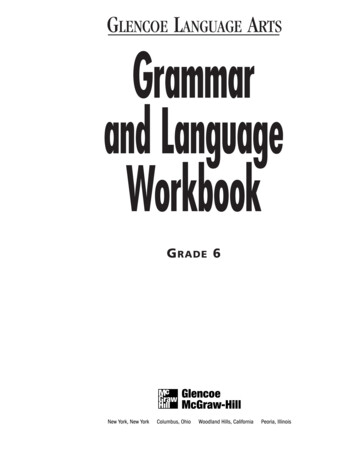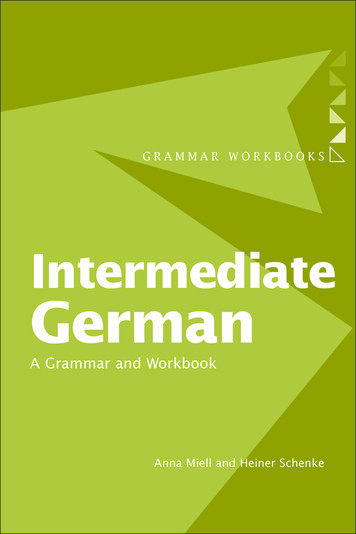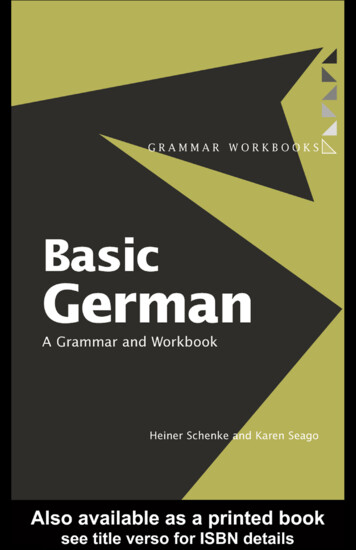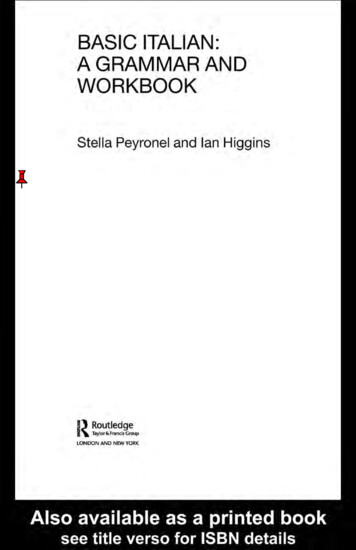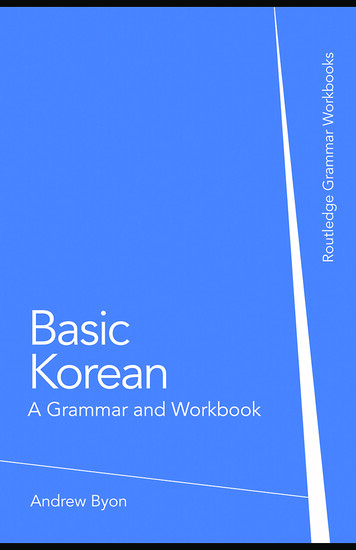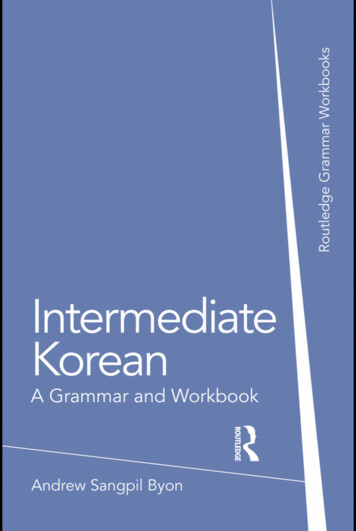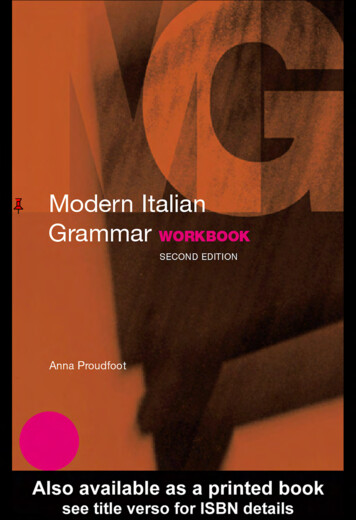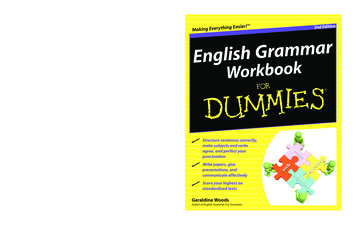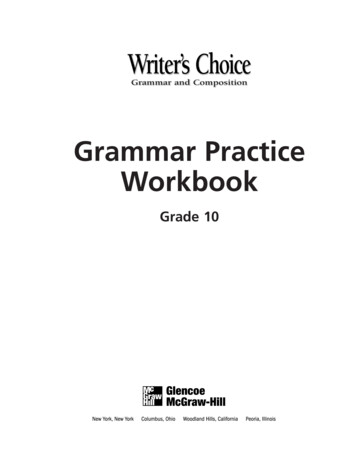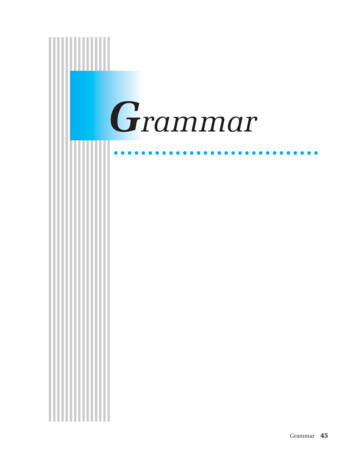
Transcription
GrammarGrammar45
Name Class DateUnit 1: Subjects, Predicates, and SentencesLesson 1Kinds of Sentences: Declarative and InterrogativeA sentence is a group of words that expresses a complete thought. Different kindsof sentences have different purposes. A declarative sentence makes a statement.It begins with a capital letter and ends with a period. An interrogative sentenceasks a question. It begins with a capital letter and ends with a question mark.GrammarMy hobby is reading mystery books. (declarative)Have you read the latest Nancy Drew book? (interrogative) Exercise 1 Write in the blank dec. before each declarative sentence and int. beforeeach interrogative sentence.Copyright by Glencoe/McGraw-Hillint.Have you ever played a mandolin?dec.1. Sleet and ice kept us housebound last weekend.int.2. Do you know how to word process?int.3. How much do these sweaters cost?dec.4. Those shelves smell like lemon oil.int.5. Do you think my hair is too long?dec.6. Tamara worked long hours to finish her painting.int.7. Are you going to Richard’s party?int.8. Was the English test difficult?dec.9. Da-chun and his dad won the sack race.dec.10. I think blue is my favorite color.dec.11. The rusty hinges creaked as Grant opened the old door.int.12. Were you born in Montana, or did you move here?int.13. Could you help me with my homework tonight?dec.14. Jane wiped her hand across her forehead.dec.15. Clear expression is an art.Unit 1, Subjects, Predicates, and Sentences47
Name Class Datedec.16. Grandma is the computer games champion in our family.int.17. Have you ever seen purple cotton candy?dec.18. This year’s starting quarterback is a math genius.int.19. Who’s going to bring the noisemakers?int.20. Did the squirrels eat all the tulip bulbs?dec.the library has several good books on the subject.int.1. Have you met Nadine?int.2. will you help me with my home economics project?dec.3. Polly perched briefly on Aunt Kara’s shoulder.dec.4. all the leaves had fallen from the tree within a day or two.int.5. Can you name that tune?dec.6. Zahara is visiting with her aunt this week.dec.7. Ricardo makes dinner on Tuesdays while his mom studies.int.8. have you looked it up in the encyclopedia?dec.9. we can’t leave until I finish my chores.dec.10. Mirna lives in the apartment above Mrs. Ting.int.11. Have you taken any classes at the art museum?int.12. Will you make a copy of that photograph for me?int.13. how did Katherine tear the cartilage in her knee?dec.14. Kenny walked across the floor on his hands.int.15. Have you heard Amelia sing her solo?int.16. Did you see that boy in the plumed hat?int.17. would you like to go to the park with us?dec.18. the refrigerator is almost empty.dec.19. this spider web wasn’t here yesterday.dec.20. A strand of ivy was painted around Marcia’s room.48 Grammar and Language Workbook, Grade 7Copyright by Glencoe/McGraw-HillGrammar Exercise 2 Write dec. before each declarative sentence and int. before eachinterrogative sentence. Add correct punctuation and capitalization where needed.
Name Class DateLesson 2Kinds of Sentences: Exclamatory and ImperativeThe purpose of an exclamatory sentence is to express strong feeling. It beginswith a capital letter and ends with an exclamation point.I aced the test! (exclamation)GrammarAn imperative sentence gives a command or makes a request. Its subject is notstated directly, but is understood to be you. Imperative sentences also begin witha capital letter and usually end with a period. A strong command may end withan exclamation point.(You) Put your essay on my desk when you are finished. (imperative)(You) Give me a break! (strong imperative) Exercise 1 Write in the blank exc. before each exclamatory sentence and imp. beforeeach imperative sentence. If a sentence is neither exclamatory nor imperative, writeneither.Copyright by Glencoe/McGraw-Hillexc. or imp.Let’s get out of here!imp.1. Choose one and then pass the rest along.exc.2. It’s a touchdown!imp.3. Please keep this to yourself.exc.4. I can do it myself!imp.5. Run away from trouble.imp.6. Leave the dance before midnight.neither7. Have you ever ridden in a hot-air balloon?imp.8. Call 911 in an emergency.exc.9. This really makes me angry!imp.10. Be particularly careful with this antique clock.exc.11. We won!imp. or exc.exc.12. Be careful!13. Rhoda just set a record for the broad jump!Unit 1, Subjects, Predicates, and Sentences49
Name Class Date14. The dense grass felt like smooth carpet.imp. or exc.15. Let me try!imp. or exc.16. Listen to me!imp.17. Wear protective clothing.imp.18. Kiss the Blarney Stone before you leave Ireland.exc.19. That’s a great idea!imp.20. Remember to stand when Dr. Chou enters the room.exc.21. I can’t believe it!imp.22. Please pass the honey.neither23. Joachim dressed as a chocolate bar for the costume party.neither24. Are you interested in going to a movie?imp.neither25. Move the picnic table to the shade.26. Apricot jam is a good glaze for baked ham.exc.27. How clever of you!imp.28. Be alert to rapidly changing weather conditions.imp. or exc.29. Give me a chance!exc.30. I don't believe it!imp.31. Be careful.imp.32. Never disturb nesting birds.imp.33. Tuck your pants inside your socks when hiking.neitherimp.34. Our new neighbors moved in yesterday.35. Define the word monsoon.neither36. Did you notice the price of that saddle?neither37. There is a Thai restaurant around the corner from us.imp.38. Hold that pose while I adjust the camera lens.exc.39. What a mess your room is!imp.40. Raise the flag at sunrise.50 Grammar and Language Workbook, Grade 7Copyright by Glencoe/McGraw-HillGrammarneither
Name Class DateLesson 3Subjects and PredicatesEvery sentence has a subject and a predicate, which together express a completethought. The subject of a sentence tells whom or what the sentence is about. Thepredicate of the sentence tells what the subject does or has. It can also tell whatthe subject is or is like.SUBJECTSunlightPREDICATEshone through the cracks in the old shed.GrammarThe simple subject, usually a noun or a pronoun, is the main word or group ofwords in the complete subject. The complete subject is the simple subject withall of its modifiers. The simple predicate, which is always a verb, is the mainword or group of words in the complete predicate. The complete predicate is thesimple predicate with all of its modifiers.SIMPLECOMPLETESUBJECTThe noise of the thunderThe noise of the thunderPREDICATEscared the children.scared the children. Exercise 1 Draw a line between the complete subject and the complete predicate.Underline each simple subject once and each simple predicate twice.Ireland is known as the Emerald Isle.1. The rolling, green landscape glows against its blue backdrop.Copyright by Glencoe/McGraw-Hill2. Mild temperatures keep the lush vegetation deep green.3. Regular rainfall keeps the soil dark and moist.4. Trees once added greatly to the greenness.5. Little woodland remains in Ireland today, however.6. Farmlands cover most of central Ireland.7. Many mountain ranges rise near the coasts.8. Ireland’s highest peak is in the Mountains of Kerry.9. Kerry is one of Ireland’s twenty-six counties.10. Kerry is a beautiful area of lakes and mountains.11. Ireland’s beautiful landscape inspired her many writers and artists.Unit 1, Subjects, Predicates, and Sentences51
Name Class Date12. Dramatists from the Emerald Isle include Padraic Colum, Sean O’Casey, and JohnSynge.13. These playwrights’ works appear at the Abbey Theater in Dublin.14. William Butler Yeats started this theater.15. Yeats was a memorable Irish poet and dramatist.16. He lived during the time known as the Irish Literary Revival.Russell.18. Joyce is the most famous of the three.19. He often wrote about Dublin and about the Irish people.20. The influence of Irish writers extended beyond their native country.21. George Bernard Shaw was popular in English and American theaters.22. Shaw’s works include Arms and the Man, Man and Superman, and Pygmalion.23. Oscar Wilde also found fame in England and the United States.24. Wilde is the author of A Woman of No Importance and The Importance of BeingEarnest as well as the novel The Picture of Dorian Gray.25. Several Irish painters perfected their craft with the help of the Royal HibernianAcademy.26. Two Irish artists are Maurice MacGonigal and Estella Solomon.27. Artists from Ireland produced great treasures over the years.28. Each captured the beauty of the Emerald Isle.52 Grammar and Language Workbook, Grade 7Copyright by Glencoe/McGraw-HillGrammar17. Other writers of this age were James Joyce, George Augustus Moore, and George
Name Class DateLesson 4Compound Subjects and PredicatesA sentence may have more than one simple subject or simple predicate. Two ormore simple subjects that have the same predicate form a compound subject. Thesubjects are joined by and, or, or but.Keisha or Alex can fix that bike for you.GrammarA compound predicate has two or more simple predicates, or verbs, that have thesame subject. The simple predicates are connected by and, or, or but.Wasps drink nectar and eat other insects. Exercise 1 Draw one line under each part of a compound subject. Draw two linesunder each part of a compound predicate.Furniture and knickknacks were available at the craft show.1. Sally and Mike will lead the parade.2. Spaghetti and manicotti were the restaurant’s specialties.3. The people in the village first resisted but then accepted the new factory.4. New carpet or wallpaper would brighten this old kitchen.5. Before the show, Simon and Ashley practiced their dialogue.Copyright by Glencoe/McGraw-Hill6. The lucky quarter rolled and bounced down the steps.7. Pink or peach will be the color of the bridesmaids’ gowns.8. A clown with shoes the size of clipper ships sang and danced at Carley’s birthdayparty.9. Lindsay and Neil filled food baskets for the homeless in their community.10. The speaker hesitated but soon began his presentation.11. Sleet or rain is predicted for the tri-state area tonight.12. Jake baked brownies and cooked pasta for the surprise party.13. Mr. Lawson wrote, directed, and produced this musical.14. The old car’s engine sputtered but eventually roared to life.Unit 1, Subjects, Predicates, and Sentences53
Name Class Date15. The crowd called and waved to the three astronauts.16. Leave your jacket on the coat rack or hang it in the closet.17. In the program, Claire and Sue were listed before Scott.18. Crocuses or daylilies would grow well there.19. Basil, olive oil, and spinach are used in that recipe.20. The tailback slashed, spun, and pounded his way through the opposing team’s21. The Spanish Club and field hockey are Dora’s favorite extracurricular activities.22. Our soccer team played hard but lost the game in the last minute.23. Joan, Tom, or Wing will head the decorations committee.24. On election day, the levy will pass or fail.25. Cake and ice cream were served to all the guests.26. Alligators or sea lions will be the topic of her report.27. Books, clothes, and other items had been collected and sold at the fundraiser.28. Sven hurried but missed his plane.29. Dr. Tarini writes or phones every participant in the study once a week.30. Cards and letters on behalf of the popular television program poured into thenetwork’s corporate offices.31. The pinch hitter swung at every pitch but missed the ball each time.32. Pizza or cherry pie is Arthur’s favorite snack.33. The Thomases and the Jordans are planning a trip to Costa Rica.34. Suits and ties are worn daily at that all-boys school.35. The rings of Saturn and the moons of Jupiter have been seen through this telescope.54 Grammar and Language Workbook, Grade 7Copyright by Glencoe/McGraw-HillGrammardefense.
Name Class DateLesson 5Sentence FragmentsA sentence must have a subject and a predicate and must express a completethought. A group of words that does not have both a subject and a predicate is anincomplete sentence, or sentence fragment.The truck, an old red one. (lacks a predicate)Slowly climbed the steep hill. (lacks a subject)On the country road outside of town. (lacks a subject and a predicate)Copyright by Glencoe/McGraw-Hillfrag.Learned about bees.sent.1. Geneticist Warwick Kerr studied honeybees.frag.2. At the University of São Paulo in Brazil.sent.3. In 1956 he imported some African queen bees.sent.4. These bees had a savage reputation.frag.5. Attacked animals and people without warning.sent.6. However, African bees sting only to defend their nest.sent.7. Most stinging incidents occur during the swarming season.frag.8. The hot summer months.sent.9. Stinging incidents by large numbers of bees are uncommon.sent.10. Dr. Kerr carefully kept the bees in enclosures.frag.11. Not another beekeeper.frag.12. Allowed twenty-six queens and their swarms to escape.sent.13. The African bees readily nested in the wilds of Brazil.frag.14. Reproducing quickly and swarming frequently.sent.15. The African honeybees began to spread.frag.16. In all directions.Unit 1, Subjects, Predicates, and Sentences55Grammar Exercise 1 Write sent. in the blank if the group of words is a sentence and write frag.if it is a fragment.
Name Class Date Exercise 2 Write S in the blank if the fragment lacks a subject and P if it lacks apredicate. If the sentence is complete, write sent.PS1. Live together in colonies.2. Did you know that a colony may contain thousands of insects?P3. One queen.S4. Produce all the eggs.P5. A special room or cell for the queen.sent.6. Bees, wasps, and ants undergo a complete metamorphosis.P7. The four stages of these insects.P8. The egg, the larva, the pupa, and the adult.P9. The female workers.sent.Ssent.10. Workers have many jobs.11. Collect food and take care of the nest, the queen, and her offspring.12. Some workers protect the nest from enemies.S13. Search for food to bring back to the colony.P14. Insects’ various ways of communication. Writing Link Write four complete sentences containing both a subject and a predicate.Copyright by Glencoe/McGraw-HillGrammarsent.Honey bees, digger wasps, and red ants.56 Grammar and Language Workbook, Grade 7
Name Class DateLesson 6Simple and Compound SentencesA simple sentence has one subject and one predicate. However, a simple sentencemay have a compound subject, a compound predicate, or both.Saturn and Jupiter are the two largest planets in our solar system. (compoundsubject)Queen bees survive the winter and lay eggs in the spring. (compound predicate)GrammarJuan and Luis throw and catch the softball. (compound subject and compoundpredicate)A compound sentence contains two or more simple sentences joined by a commaand a coordinating conjunction or by a semicolon. (and, but, or, nor or for)Priscilla enjoys reading about technology, but she doesn’t care for sciencefiction.Paramecium are very small; a microscope is needed to examine them.A run-on sentence is two or more sentences incorrectly written as one sentence.To correct a run-on sentence, divide it into separate sentences or add thenecessary words or punctuation to form one complete sentence.Copyright by Glencoe/McGraw-HillRun-on: The movie was long I got restless.Corrected: The movie was long. I got restless.Corrected: The movie was long, and I got restless. Exercise 1 Write S in the blank before each simple sentence, C before each compoundsentence, and R before each run-on sentence.SThe directions are simple and straight-forward.C1. Florida and Georgia are the only southern states I’ve visited, but I’ve been inevery state in New England.S2. Skating and skiing are Aaron’s favorite cold weather sports.R3. Turn right at the stop sign go left at the next corner.R4. Six inches of snow are predicted, I’d better find my boots.S5. Both Kuma and Angie enjoy hiking and backpacking.R6. Try it, you’ll like it.C7. Liam had a solo in last year’s concert; he hopes to have one this year, too.Unit 1, Subjects, Predicates, and Sentences57
S8. Niabi plays both the oboe and the piano and plays them very well.C9. George and Helene can’t agree on a country for their report, but they want tochoose one in Eastern Europe.S10. Lately, all of my clothes seem too small.S11. The meal ended with carrot cake and tea.S12. Why do I have to clean my room and the bathroom?R13. I have too many clothes, my closet is stuffed.C14. We went to the reptile house, and later we saw the pachyderms.C15. I always agree with Marta, and Marta always agrees with me.C16. The shelves are filled with books, but I can’t find one I want.R17. Tia can’t come she has to baby-sit.R18. Conserve resources, use them wisely.C19. Please be kind to Amy; she needs a friend right now.C20. Should I take the bus to school, or should I walk?R21. Rain forced cancellation of the game, it is rescheduled for next week.S22. Beth and Ricardo need a ride to the pep rally tomorrow.C23. The storm blew down a tree on our street, but there was no other damage.S24. We have a new system for recycling at home.R25. Don’t use a stapler, use paper clips.S26. Look for Jeff and Dominic in the crowd.C27. Yoko’s aunt lives in California, and her uncle lives in Arizona.R28. A canoe is not as stable as a rowboat, be careful not to tip it.C29. Terry has just moved here, and she doesn’t know very many people.R30. The accident ruined the car, fortunately no one was seriously injured.58 Grammar and Language Workbook, Grade 7Copyright by Glencoe/McGraw-HillGrammarName Class Date
Name Class DateUnit 1 Review Exercise 1 Write dec. before each declarative sentence, int. before each interrogativesentence, imp. before each imperative sentence, and exc. before each exclamatory sentence.Button your sweater.int.1. How much memory does that computer have?exc.2. Tricia, your hair’s on fire!dec.3. The Lopez family enjoys watching old movies together.int.4. How can I get this project done on time?dec.5. Georgia knows that author.imp.6. Try to have supper ready at six o’clock.exc.7. You look elegant!dec.8. That combination of colors is quite striking.imp.9. Put out the trash on Wednesday morning.dec.10. Both soccer and tennis have great teams this year.exc.11. Get the fire extinguisher!int.12. Will you turn out the lights before you go to bed?imp.13. Turn out the lights before you go to bed.imp.14. Pull the thorn out before your finger blisters.GrammarCopyright by Glencoe/McGraw-Hillimp. Exercise 2 Draw one line under the complete subject and two lines under thecomplete predicate.1. Marla’s pet monkey chatters all day long.2. Enrico’s mom has photos of her trip to South America.3. The population of the United States is increasing.4. Do you know how to make snickerdoodles?5. I am so excited!6. Larry hid Easter eggs in his neighbor’s backyard.Unit 1, Subjects, Predicates, and Sentences59
Name Class DateCumulative Review: Unit 1 Exercise 1 Write S next to each simple sentence, C next to each compound sentence,frag. next to each sentence fragment, and R next to each run-on sentence. Draw one lineunder each simple subject and two lines under each simple predicate in the simple andcomplex sentences.GrammarSfrag.Too sweet to be forgotten.1. Lucy practices jai alai four hours a day.2. Mount Fuji, one of the most famous volcanoes in Japan.C3. I played the marimba, and George played guitar.S4. The musty cave housed ancient Mayan carvings.C5. The judge banged the gavel, and a hush fell instantly over the courtroom.R6. The candle cast a dim glow upon the curtain, the scene looked eerie.frag.Sfrag.7. The success of the demonstration.8. Max rode Lightning through the stream and up the hill.9. Shot a few hoops with Jim yesterday.S10. Shovel the walks, please.S11. Díaz and Benny coach a little league team.S12. Josh washed and polished the car.frag.13. Enlisted in the Coast Guard at eighteen.frag.14. The sleepy lion with the orange mane.R15. Rain fell for hours the basement flooded.C16. Ivan the Great was the first czar of Russia; however, Ivan the Terrible was morepowerful.S17. Sergei’s family is from Moscow.S18. The wolf huffed and puffed.frag.C19. Moved round the cove and next to the cliffs.20. The job was easy, but the pay was low.60 Grammar and Language Workbook, Grade 7Copyright by Glencoe/McGraw-Hillfrag.
Name Class DateUnit 2: NounsLesson 7Nouns: Proper and CommonA noun names a person, place, thing, or idea. A singular noun names one person,place, thing, or idea. A plural noun names more than one. Plural nouns areusually formed by adding -s or -es to the singular uthsGrammarSINGULAR:PLURAL:A proper noun names a specific person, place, thing, or idea. A common nounnames any person, place, thing, or idea.PROPER:COMMON:Thomas AlvarezmanCanadacountrySears Towerbuildingthe Bronze Ageage Exercise 1 Write sing. in the blank if the italicized word is a singular noun. Write pl.if it is plural.Copyright by Glencoe/McGraw-Hillpl.Juanita suggested that my boys visit the circus.sing.1. Circus Royale was the name of the circus that came to town last week.sing.2. The opening parade was a great introduction to the event.pl.3. The nine elephants were trained by a man named Zingarelli.pl.4. One of the best acts was a family of acrobats from Paris.sing.pl.5. A juggler managed to juggle eight saucers at once.6. A band played marches by Sousa and rags by Joplin.sing.7. The ringmaster’s voice was loud enough to be heard without a microphone.sing.8. When the wildcat act appeared, the audience applauded with glee.pl.pl.9. Besides lions and tigers, a cheetah and a panther were in the act.10. After the wildcat act, fourteen clowns emerged from a tiny car.sing.11. Do you have any idea how all of them could fit into that tiny car?sing.12. Although they used a net, the Flying Greiners were thrilling on the trapeze.sing.13. My little sister, Nina, wants to learn to perform on the high wire.Unit 2, Nouns61
Name Class Datesing.pl.14. However, my favorite act was the magician.15. I would go to circuses every week if I had the chance. Exercise 2 Draw one line under each common noun and two lines under each propernoun.P.T. Barnum has a name that reminds many people of the circus.1. He was born in Bethel, Connecticut, as Phineas Taylor Barnum.3. Charles Dickens and Edward VII were among those who came to the museum.4. Charles S. Stratton probably brought in the most money.5. Only 25 inches tall, Stratton called himself “General Tom Thumb.”6. In 1871, William Cameron Coup joined Barnum to take the circus on the road.7. They called it “The Greatest Show on Earth.”8. The two showmen amazed many government leaders, including Abraham Lincoln andQueen Victoria.9. During the run of the circus, Barnum served a term as mayor of Bridgeport, Connecticut.10. After some time in politics, Barnum visited the London Zoo.11. There, he acquired a large African elephant.12. The elephant, named Jumbo, weighed over six tons!13. James A. Bailey, a later partner of Barnum, helped to improve the circus.14. Before his death in 1891, Barnum hosted many famous people, including Mark Twain.15. In 1907, after Bailey died, the Ringling Brothers bought the show. Writing Link Write two or three sentences about what job you would like to have in acircus. Include both common and proper nouns.62 Grammar and Language Workbook, Grade 7Copyright by Glencoe/McGraw-HillGrammar2. In 1841, Barnum began to work in New York City, managing the American Museum.
Name Class DateLesson 8Nouns: Concrete, Abstract, and CollectiveConcrete nouns name things that you can recognize with your senses.Abstract nouns name ideas, qualities, or feelings.A collective noun gives a single name to a group of individuals. When referringto a group as a unit, the noun is singular. When referring to the individualmembers of the group, the noun is deaprogresstimecultureGrammarThe mob was waiting at the door for the store to open. (a unit, singular)The panel are discussing the issues with each other. (individual members,plural)COLLECTIVE:crowdcommitteefamilyteam Exercise 1 Write in the blank concrete or abstract to identify the type of noun initalics.Copyright by Glencoe/McGraw-HillabstractThe boys had great sympathy for Juan’s situation.concrete1. Why did Sharon begin playing the tuba?abstract2. The entire house was decorated with excellent taste.abstract3. Barry’s adoration for his grandmother brought her much joy.concrete4. The hissing of the radiator distracted him.concrete5. The barbershop quartet rehearsed in the cafeteria.concrete6. The spectators saw the entire production on a huge monitor.abstract7. Cleanliness is important to my mother.abstract8. If anyone has a better idea, I’ll support it.concrete9. Dad enjoyed listening to music on his new car CD player.concrete10. My friend brought some oranges back from Florida.abstract11. The success of the recycling program depended on everyone’scooperation.Unit 2, Nouns63
Name Class Dateconcrete12. Margit’s new bedspread is very colorful.abstract13. It took courage to sing the solo in front of so many people.concrete14. Aside from one baby, the audience was extremely quiet.abstract15. Bella showed great ability for solving logic problems. Exercise 2 Draw two lines under the verb that agrees with the collective noun subject.1. A new committee (has been, have been) formed to plan the field trip.2. The team (selects, select) their officers by secret ballot.3. The Audubon Society (promote, promotes) the conservation of wild birds.4. The audience (is, are) aware that they were lucky to get tickets.5. Because it is fed only once daily, the flock (eats, eat) very fast.6. The trio (performs, perform) at many local festivities.7. My family (begin, begins) the holiday at six o’clock.8. The jury (is, are) all members of the community.9. The team (has, have) an awards banquet at the end of the regular season.10. A panel of judges (presides, preside) over the Supreme Court.11. Although it is small, our orchestra (is, are) well rehearsed.12. The school club (provides, provide) assistance to local charities.13. The committee (disagrees, disagree) with each other about proper procedure.14. Outside my bedroom window, the swarm of bees (buzzes, buzz) loudly.15. The matinee audience (is, are) usually smaller than the evening crowd. Writing Link Write a short paragraph about selecting officers for a club to which youbelong. Use examples of concrete, abstract, and collective nouns.64 Grammar and Language Workbook, Grade 7Copyright by Glencoe/McGraw-HillGrammarThe band (is, are) polishing their instruments before the competition.
Name Class DateLesson 9Nouns: Compound and PossessiveCompound nouns are nouns that are made up of two or more words. To form aplural of a compound noun written as one word, add -s or -es. Add -es to wordsending in ch, sh, s, x, and z. When the compound noun is hyphenated or writtenas more than one word, make the most important part of the noun plural.doorknobs mailboxes great-grandmothers dining roomssisters-in-lawa girl’s coatHans’s jobchildren’s voicesboys’ shoesGrammarA possessive noun names who or what owns or has something. To form thepossessive for all singular nouns and for plural nouns not ending in -s, add anapostrophe and an -s. To form the possessive of all plural nouns already endingin -s, add only an apostrophe.bakeries’ cakes Exercise 1 Write in the blank the correct plural form of the compound noun ght by Glencoe/McGraw-HillsnowballsDuring the holidays, we visit both of my (grandmother).1. The (teardrop) fell from her check as she sobbed.2. (Moonbeam) cut through the trees of the forest.3. After school, we hurled (snowball) at our friends.Earthworms4. (Earthworm) improve the soil in our garden.runners-up5. At the end of the contest, the (runner-up) collected theirawards.record holdersnutcrackers6. This Olympics is filled with (record holder).7. My Aunt Minya collects (nutcracker).nursery rhymes8. Before bedtime, Carla’s father reads her two (nursery rhyme).mothers-in-law9. Our family tradition calls for all (mother-in-law) to bake a pieat Thanksgiving.morning starsLighthouseslifeguards10. Just before sunrise, the (morning star) twinkle beautifully.11. (Lighthouse) protect the coastline of Maine.12. The (lifeguard) at the amusement park do a noble job.Unit 2, Nouns65
Name Class Dateoverpasses13. The city is repairing several (overpass).keyholes14. Old houses have (keyhole) that you can look through.music boxes15. My little sister has a whole collection of (music box). Exercise 2 Write in the blank the possessive form of the noun in italics.Washington’sGrammarson’sCharles’
Lesson 3 Subjects and Predicates Every sentence has a subject and a predicate, which together express a complete thought. The subject of a sentence tells whom or what the sentence is about.The predicate of the sentence
